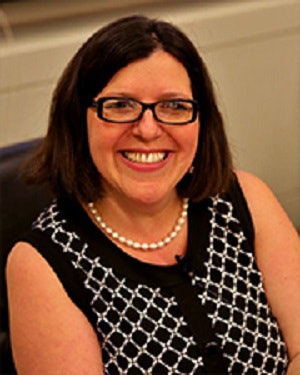To increase the number of historically Black college and university (HBCUs) students pursuing entrepreneurial career paths, the Rutgers Center for Minority Serving Institutions (CMSI) partnered with mentorship network The Whether to create the Mary Ellen Pleasant Entrepreneur (MEPE) fellowship program.
During a 10-week fellowship experience that took place online last year, 25 students from 17 partner HBCUs worked to develop entrepreneurial skills through peer mentorship. The fellowship was funded by the Bill and Melinda Gates Foundation as part of the $775,000 Innovations in Career Advising grant. Fellows each ran their own career-advising business online to provide their peers with the necessary skills needed to run their own business.
 Dr. Marybeth Gasman
Dr. Marybeth Gasman“I love any kind of opportunity where you can see undergraduate students really shine. And show you their absolute best when it comes to the skills that they’ve learned,” said Dr. Marybeth Gasman, Samuel DeWitt Proctor Endowed Chair in Education and a distinguished professor at Rutgers University. “And I think this was a great opportunity for us to see that. Given what’s going on right now, [it’s] a reminder of just how much talent there is among undergraduate students. And also, you know, a reminder of how valuable HBCUs are is really important.”
To underscore the impact of the fellowship, CMSI recently released a report, “Encouraging Entrepreneurship at Historically Black Colleges and Universities.” The report featured each program fellow and highlighted their motivations and future career goals.
“My goal in part was to create an experience where students were taken out of their comfort zones and need to adapt,” said Chris Motley, founder and CEO of The Whether. “The current crisis provides yet another opportunity to tap into the learnings from the fellowship.”
A majority of the fellows had little prior experience with entrepreneurship. Many of the fellows became independently interested in entrepreneurship, seeing it as a way to further their professional careers. And for many who were passionate about social issues, it was a chance to convert that passion into a potential business idea.
The fellows each took The Whether’s Clarity Assessment, which provided insights on their decision-making and relationship building skills as well as possible career paths. The fellows’ top three key strengths, revealed the clarity assessment, were that they were “change-oriented, kind-hearted and very inquisitive.” Their key caution areas were that they “could be highly judgmental, tend to take things personally and could hold on to anger,” according to the report.
After completing their self-assessment, the fellows were assigned the task of introducing the test to peers on their individual campuses. Students also received ongoing individual mentorship throughout the process.
“Because The Whether is a group of African-Americans who are entrepreneurs, they were mentoring these young African-American HBCU students who want to be entrepreneurs,” said Gasman. “And so that was very powerful for the students because they got to engage with people who were in the place that they wanted to be. And I think that’s always really exciting.”
 Mya Jacobs
Mya JacobsAt the end of the fellowship, students were given an opportunity to reflect on their experiences.
As a business major, Mya Jacobs, a MEPE fellow and student at Xavier University of Louisiana, found the networking aspect to be the most beneficial part of the program.
“I feel like it’s something that you start taking for granted because you just do it so often,” she said. “But with MEPE, I was talking to people from my other schools, these are my HBCU counterparts. And I just remember that I was so elated that this was a different type of networking and that I was talking to people that I would one day want to own businesses with and people that I would one day be calling on for help with my career because I’m watching what they’re doing.”
According to the report, imitating the start-up experience proved to be more difficult than expected for students.
“I think it’s interesting because they said that it was challenging,” said Gasman. “You know, when you get a fellowship and it’s virtual, you might think at first this won’t be too difficult. But it was a very challenging task to engage their colleagues and their fellow students.”
Additionally, Gasman said this fellowship provided students with a sense of whether or not they really wanted to be an entrepreneur.
“So, whether or not they wanted to have so much responsibility on themselves or whether they’d rather kind of implement the ideas of someone else who’s an entrepreneur,” she added.
Minority business enterprises represent 29% of all firms but only 11% of paid employees. Black-owned businesses account for 9.4% of the nation’s businesses, the report said.
Jacobs said that with more financial support, entrepreneurship can be an attractive option for Black students “who are very passionate about disrupting generational poverty cycles and really maximizing the value of their time with their net worth after college.”
In addition to financial support, to encourage more Black entrepreneurs and increase the number of minority-owned businesses, Gasman recommended that institutions introduce the idea of entrepreneurship into the classroom curriculum.
Sarah Wood can be reached at [email protected].

![Mentor Mentee [60287]](https://img.diverseeducation.com/files/base/diverse/all/image/2024/04/Mentor_mentee__60287_.662959db8fddb.png?auto=format%2Ccompress&fit=crop&h=100&q=70&w=100)



















